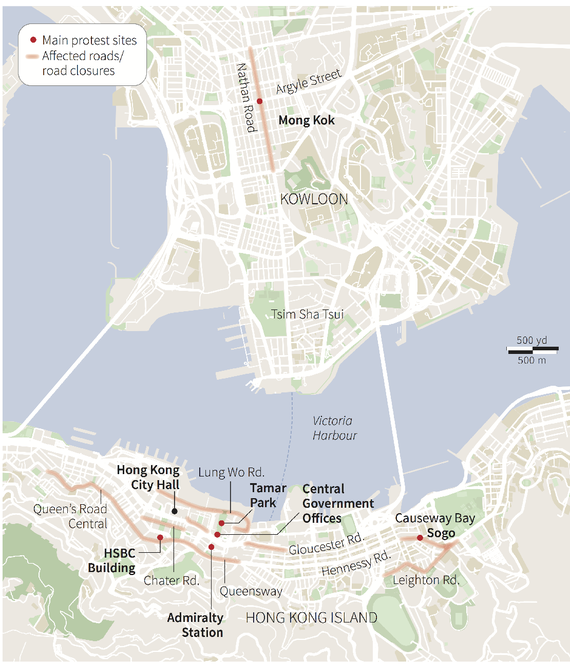In The Atlantic, Bourree Lam looks at where the Hong Kong protests tend to be located:
Hong Kong’s “umbrella revolution” — an anticipated protest movement with unanticipated mass turnout — is currently spreading across an island slightly bigger than Manhattan.
The Occupy Central with Love and Peace (OCLP) campaign, whose main demands are the resignation of Chief Executive CY Leung and true democracy for Hong Kong, announced months ago that it planned to shut down Hong Kong’s Central District — the city’s financial hub, which also houses government offices (including the Legislative Council’s buildings and the chief executive’s residence) and a luxury-shopping strip featuring a city block-wide Louis Vuitton store (by night it’s where tourist and locals go drinking and clubbing, especially in the Lan Kwai Fong area). Beginning with British colonial rule in 1841, the district has gradually become the main artery of Hong Kong’s business and social life.
But the protest movement, of which the OCLP is now just one part, has expanded in the last few days to the districts of Admiralty, Causeway Bay, and Mongkok — some of the city’s most bustling commercial sectors. On Tuesday, the protests encompassed the areas of Tsim Sha Tsui and Wan Chai. And, in a twist on the ‘Occupy’ movement in the United States, the demonstrations haven’t been confined to public squares; they’ve also spread to intersections, forcing road closures. Protesters, for instance, are currently holding their positions on Connaught Road Central, a major six-lane throughway that connects four districts on the island.
[…]
Update: Zachary Keck is quite pessimistic on the chances for success.
As covered extensively in The Diplomat, tens of thousands of protesters have taken to the streets of Hong Kong demanding democratic reforms. Specifically, the protesters want free and fair elections and universal suffrage to select the city’s government, which Beijing promised as part of the condition for the U.K. handing back the city to mainland China.
Sadly, Occupy Central is doomed to fail. The Chinese government will not accept the protesters’ demands.
Beijing has already made it clear that it views free and fair elections in Hong Kong to be a threat to one-party rule in the country. At most, it will allow Hongkongers to select one of the candidates that it pre-approves. It has also deemed Occupy Central illegal. In other words, the Chinese Communist Party views the issue as one of its “core interests,” and it hasn’t stayed in power this long by compromising on issues that it views as threats to its survival.
[…]
The massive protests that have swept through Hong Kong in recent days have only made it more urgent that the CCP hold the line on the issue. The Party can ill afford an example of mass demonstrations forcing it to compromise on an issue deemed to be of core importance. Before the protests, it was possible the CCP might have assessed that free and fair elections in Hong Kong would not threaten one-Party rule on the mainland because of the “one country, two systems” mantra. However, the Party giving in on a core issue because of mass protests would, without question, set a dangerous precedent for the CCP’s grip on power in mainland China. It therefore will not be done.
This isn’t to say that a violent crackdown is coming. Indeed, as is almost always the case, the CCP will want the local government on the frontlines in handling the protesters, while Beijing directs things from behind the scenes. As Steve Hess has pointed out in The Diplomat, using local governments as scapegoats has long been an effective tool of the CCP. If it means the restoration of stability, that could very well mean the end of CY Leung’s career. It’s also possible some sort of “compromise” will be worked out that allows the protesters to claim some sort of victory without compromising the CCP’s ability to maintain a large degree of control over the chief executive of Hong Kong.




